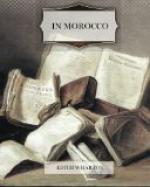Not in vain; for after an hour or two, from far off in the direction of the hills, there appeared an army with banners. We stared at it unbelievingly. The mirage, of course! We were too sophisticated to doubt it, and tales of sun-dazed travellers mocked by such visions rose in our well-stocked memories.
The chauffeur thought otherwise. “Good! That’s a pilgrimage from the mountains. They’re going to Sale to pray at the tomb of the marabout; to-day is his feast-day.”
And so they were! And as we hung on their approach, and speculated as to the chances of their stopping to help, I had time to note the beauty of this long train winding toward us under parti-colored banners. There was something celestial, almost diaphanous, in the hundreds of figures turbaned and draped in white, marching slowly through the hot colorless radiance over the hot colorless sand.
The most part were on foot, or bestriding tiny donkeys, but a stately Caid rode alone at the end of the line on a horse saddled with crimson velvet, and to him our officer appealed.
The Caid courteously responded, and twenty or thirty pilgrims were ordered to harness themselves to the motor and haul it back to the trail, while the rest of the procession moved hieratically onward.
I felt scruples at turning from their path even a fraction of this pious company; but they fell to with a saintly readiness, and before long the motor was on the trail. Then rewards were dispensed; and instantly those holy men became a prey to the darkest passions. Even in this land of contrasts the transition from pious serenity to rapacious rage can seldom have been more rapid. The devotees of the marabout fought, screamed, tore their garments and rolled over each other with sanguinary gestures in the struggle for our pesetas; then, perceiving our indifference, they suddenly remembered their religious duties, scrambled to their feet, tucked up their flying draperies, and raced after the tail-end of the procession.
Through a golden heat-haze we struggled on to the hills. The country was fallow, and in great part too sandy for agriculture, but here and there we came on one of the deep-set Moroccan rivers, with a reddish-yellow course channelled between perpendicular banks of red earth, and marked by a thin line of verdure that widened to fruit-gardens wherever a village had sprung up. We traversed several of these “sedentary"[A] villages, nourwals of clay houses with thatched conical roofs, in gardens of fig, apricot and pomegranate that must be so many pink and white paradises after the winter rains.
[Footnote A: So called to distinguish them from the tent villages of the less settled groups.]
One of these villages seemed to be inhabited entirely by blacks, big friendly creatures who came out to tell us by which trail to reach the bridge over the yellow oued. In the oued their womenkind were washing the variegated family rags. They were handsome blue-bronze creatures, bare to the waist, with tight black astrakhan curls and firmly sculptured legs and ankles; and all around them, like a swarm of gnats, danced countless jolly pickaninnies, naked as lizards, with the spindle legs and globular stomachs of children fed only on cereals.




